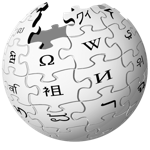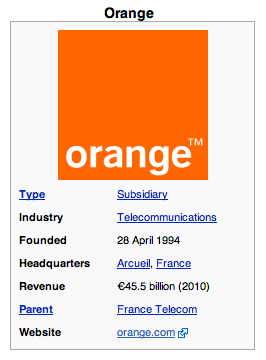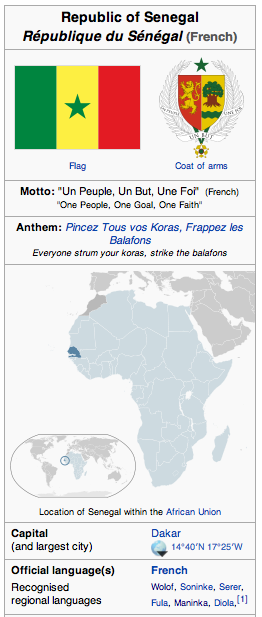Many of us take cheap high-speed Internet access for granted. I think nothing of downloading an MP3 album from Amazon MP3 while streaming a movie from Netflix on the Roku and browsing the Web on a powerful computer. That’s not a luxury that’s available to everyone, and in some parts of the world data charges prove prohibitive for going online for information.

To help counter that, the Wikimedia Foundation and Orange have come up with a plan for free Wikipedia access. Overall, the deal looks like a win for users, but it does raise a couple of questions as well. How is Wikipedia access going to change Africa and the Middle East?
Yesterday, Wikimedia and Orange announced a deal to provide more than 70 million people with mobile access to Wikipedia at no cost. Through the deal, subscribers in remote and urban areas of Africa and the Middle East (AMEA) will get to use Wikipedia through mobile phones with no data charge.
Backstory
Orange is the fifth-largest telecom operator in the world, and it services 20 countries in AMEA. This includes Botswana, Cameroon, Egypt, Jordan, Kenya, Mali, Mauritius, Niger, Senegal, Tunisia and Uganda.

Jay Walsh, the Wikimedia Foundation’s head of communications, said that the organization has been in conversations “for quite a while to try to build efforts around mobile strategy” where “one of the key planks is to bring partners who are keen to provide Wikipedia for free without any data charges.”
According to Walsh, Wikipedia has seen a “dramatic increase in people connecting from mobile devices” but as more and more people come online in AMEA cost of data access has been a major impediment. Since we’re talking Wikipedia here, let’s look at just one country (Senegal) served by Orange according to Wikipedia. Orange is one of three telecom providers. The country has about 278,000 landlines for nearly 12 million people, but nearly 3.5 million mobile subscribers. Internet penetration is less than one percent according to Wikipedia. So this represents a huge potential market.
Naturally, Orange isn’t the only company operating in AMEA, so providing Wikipedia access to customers isn’t just a goodwill gesture – it gives the company an added feature to entice customers to sign up for subscriptions with it instead of, say, Tigo in Senegal. If Wikipedia access proves popular, though, expect the Wikimedia Foundation to work with other carriers as well.
Read-Only
Part of the point of Wikipedia is that it’s not read-only. We not only have access to a huge body of knowledge, we have the ability to edit or add to it. At least at first, the audience that Orange brings to the table is going to be in read-only mode.

Walsh says that initially, it will be largely read-only. Most customers in the regions served by the free data programs are not going to be iPhones or Android phones. They’ll be phones that don’t readily lend themselves to editing Wikipedia. However, Walsh did say that Wikimedia is “looking at what things are necessary to make editing much more friendly on the phone.”
When editing does become easier, it will likely require Wikipedia to add new languages and new contributors will beef up entries in existing languages. If you look at Sengal, the Wolof-speaking population is about 43% of the country. Currently Wikipedia has only about 1,000 entries in Wolof (compared to more than 100,000 in English).
Wikipedia Policies
When Orange’s customers do have access to edit Wikipedia, another question comes to the fore. How are Wikipedia’s policies going to change, if at all, to accommodate an influx of users who want to contribute but may not be able to cite works according to Wikipedia’s current standards.
Users in some parts of Africa or the Middle East may want to add information that’s been passed down through oral tradition or might have other issues in being cited according to current Wikipedia standards. Walsh says that citation and other problems that might be encountered for AMEA users are “something that’s actively being discussed.”
At the same time, Walsh says that “people come to Wikipedia and edit it… because of those policies. They don’t necessarily want to radically transform it.”
Wikipedia Only
Assuming the program takes off, this also gives Wikipedia a sort of monopoly in areas where Orange provides free access. It’s easy for users in North America (for instance) to hit Google and look up any topic, where Wikipedia is merely one of many sources of information. In this instance, Wikipedia may be the only source of information.
Customers will only be able to access content on Wikipedia itself, so any cited works and references linked from Wikipedia will effectively be off-limits to users who can’t afford to pay data rates. Walsh says that users will be given fair warning before leaving the site, though. “We warn the user with a banner at the top of page when they click a link that would incur data charges. The user has to accept the charges to continue to the resource.”
It also raises the question of using Wikipedia to spread disinformation. One of the areas where Orange is rolling out the program is Egypt. It’s interesting to imagine how the Egyptian government might have used Wikipedia during the revolution, or how other countries might try to influence people within AMEA.
Or consider how China’s Ministry of Foreign Affairs might want to influence Wikipedia entries related to Senegal. Check the China and Senegal entry on China’s Ministry of Foreign Affairs site and compare with the Al Jazeera report on how the Chinese are changing Senegal.
Having a single source of information means that it’s much easier for organized attempts to influence what’s visible, and the slant of coverage. This is not a criticism of Wikipedia – but over-reliance on any single source of information is not an altogether good thing. It just happens that Wikipedia stands to become the single source of information here.
Wait and See
Access to Orange customers in AMEA will be rolled out through 2012. How it affects users in AMEA, and how they affect Wikipedia, will be interesting. Wikipedia has already had a significant influence on much of the world with cheap Internet access. The impact in countries that are just coming online is likely to be substantial.
Though the deal does raise a few questions, it’s worth noting that this does seem largely positive for people getting access to Wikipedia. Access to more information is almost always a win. Free access to a comprehensive source like Wikipedia seems likely to be very beneficial.










